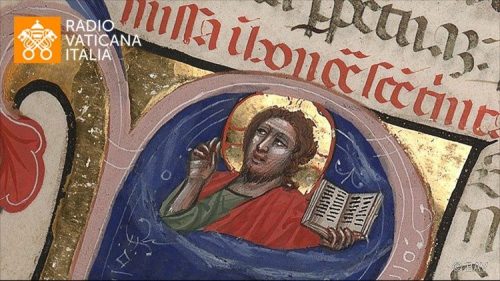READING OF THE DAY
EPH 4:32–5:8
Brothers and sisters:
Be kind to one another, compassionate,
forgiving one another as God has forgiven you in Christ.
Be imitators of God, as beloved children, and live in love,
as Christ loved us and handed himself over for us
as a sacrificial offering to God for a fragrant aroma.
Immorality or any impurity or greed must not even be mentioned among you,
as is fitting among holy ones,
no obscenity or silly or suggestive talk, which is out of place,
but instead, thanksgiving.
Be sure of this, that no immoral or impure or greedy person,
that is, an idolater,
has any inheritance in the Kingdom of Christ and of God.
Let no one deceive you with empty arguments,
for because of these things
the wrath of God is coming upon the disobedient.
So do not be associated with them.
For you were once darkness,
but now you are light in the Lord.
Live as children of light.
GOSPEL OF THE DAY
LK 13:10-17
Jesus was teaching in a synagogue on the sabbath.
And a woman was there who for eighteen years
had been crippled by a spirit;
she was bent over, completely incapable of standing erect.
When Jesus saw her, he called to her and said,
“Woman, you are set free of your infirmity.”
He laid his hands on her,
and she at once stood up straight and glorified God.
But the leader of the synagogue,
indignant that Jesus had cured on the sabbath,
said to the crowd in reply,
“There are six days when work should be done.
Come on those days to be cured, not on the sabbath day.”
The Lord said to him in reply, “Hypocrites!
Does not each one of you on the sabbath
untie his ox or his ass from the manger
and lead it out for watering?
This daughter of Abraham,
whom Satan has bound for eighteen years now,
ought she not to have been set free on the sabbath day
from this bondage?”
When he said this, all his adversaries were humiliated;
and the whole crowd rejoiced at all the splendid deeds done by him.
WORDS OF THE HOLY FATHER
An examination of conscience regarding our words, as St Paul proposes, will help us to answer an essential question about ourselves: Are we Christians of light, of darkness, or worse, are we gray Christians? Pope Francis asked this question during Mass at Santa Marta on Monday morning, 27 October.
As his point of departure for this essential examination of conscience, the Holy Father turned to the Letter to the Ephesians (4:32-5:8): “St Paul says to the Christians that we must behave as children of light and not as children of darkness, as we once were”. And “to explain this, both he and the Gospel (Lk 13:10-17) offer a catechesis on language: what is the speech of a child of light and what is the speech of a child of darkness”.
Thus, the Pope explained, beginning the Pauline catechesis, “the speech of a child who is not of light might be obscene words, vulgar words”. Indeed, the Apostle says: “But immorality and all impurity or covetousness must not even be named among you” (Eph 5:3).
And thus, Francis pointed out, “a child of light doesn’t have this vulgar language, this dirty language”.
There is, however, “a second kind of speech, a worldly speech”. Such that Paul suggests that “filthiness, nor silly talk, nor levity” should even be spoken. And “worldliness is vulgar and trivial”, the Pope remarked. On his part, “a child of light isn’t worldly and mustn’t speak of worldliness, of vulgarity”.
But St Paul goes further and says: “Be careful, let no one deceive you with empty words”. Since this message is still quite relevant today, the Pontiff immediately added, with regard to empty words: “we hear a lot of them”. And some of them are even “beautiful, well spoken, but empty, with nothing behind them”. For this reason, “not even this is the language of the child of light”.
Still, Francis stated, “there is another word of the Gospel” and it is exactly “the one that Jesus says to the doctors of the law: ‘Hypocrites’”. Yes, the very word, “hypocrite”. The Pope explained that we, too, “might think about how our speech is: is it hypocritical? Is it a little here and a little there, in order to be okay with everyone? Is it empty speech, without substance, full of vacuity? Is it vulgar, trivial, that is, worldly speech? Is it dirty, obscene speech?”. St Paul says clearly, the Bishop of Rome explained, that these four types of speech “don’t belong to children of light, they don’t come from the Holy Spirit, they don’t come from Jesus”, they don’t come from the Gospel. Therefore, “this way of speaking, always talking about dirty or worldly or vacuous things or speaking hypocritically” isn’t befitting of children of light. On the other hand, “what is the speech of saints, that is, the language of a child of light?”. The answer again comes from Paul: “Be imitators of God, walk in love; walk in goodness; walk in docility”. Those who walk like this are children of light. And moreover, “Be tenderhearted”, Paul says, “forgiving one another, as God in Christ forgave you. Therefore be imitators of God” and “walk in love”.
In substance, this exhortation invites us to walk in “mercy, in forgiveness, in charity”. This is precisely “the speech of a child of light”, Francis affirmed, as he left the Letter to the Ephesians.
“Today the Church leads us to reflect on the way of speaking and from this she will help us to understand whether we are children of light or children of darkness”, the Pope indicated. He then provided guidance in practical points of reference: “Remember: no obscene language! No vulgar and worldly words! No vacuous words! No hypocritical words!”. These types of speech, in fact, “do not belong to God, they belong to the Evil One”.
It’s true, the Pontiff related, that we can really understand and recognize the differences between children of light and children of darkness. “Children of light shine” as Jesus says to his disciples: “May your works shine and give glory to the Father”. It is an obvious fact that “the light shines and illuminates others on the path”. And “there are luminous Christians, full of light, who seek to serve the Lord with this light”. As on the other side, “there are dark Christians, who want nothing from the Lord and who lead a life of sin, a life far away from the Lord”. And these Christians use the four types of speech that Paul indicated.
However, not everything is always so clear and recognizable: on one hand the children of darkness and on the other the children of light. “There is a third group of Christians”, Pope Francis explained, “that is the most difficult and complex of all: the neither light nor dark Christians”. And these “are Christians in a gray area”, who “are on this side one time, and on the other” at another time. Such that, speaking of them, people say: “is this person okay with God or with the Devil?”. And they say this because these Christians are “always in a gray area: they are lukewarm” and “they are neither luminous nor dark”.
But “God doesn’t love these ones”. We read this in Revelation when “the Lord says to these Christians of grayness, “you are neither cold nor hot. Would that you were cold or hot! So, because you are lukewarm” — gray — “I will spew you out of my mouth”.
So, the Pope said, “the Lord is harsh with gray Christians”. And it’s no use justifying in self-defence, “I am a Christian, but I don’t overdo it”.
These gray people, in fact “do a lot of harm, because their Christian testimony is a testimony that, in the end, sows confusion, sows a negative testament”. And Paul is particularly clear in this regard: “once you were darkness, but now you are light in the Lord. Walk as children of light”. Paul says “children of light” and “not children of darkness, not children of grayness”.
The passage of St Paul, Francis concluded, is a good thermometer for reconsidering “our language”. And it may be helpful to answer these questions: “How do we speak? Which of these four [types of] words do we speak with? Obscene words, worldly, vulgar words, vacuous words, hypocritical words?”. And the answer to these questions, the Pope added, should suggest another question: “Am I a Christian of light? Am I a Christian of darkness? Am I a Christian of grayness?”. This practical examination of conscience will help us “to take a step forward, to encounter the Lord”.
(Santa Marta, 27 October 2014)

